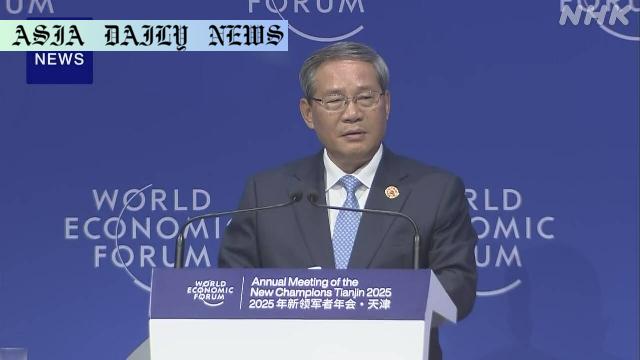Free Trade: Chinese Premier Li Qiang urges nations to prioritize safeguarding free trade amid rising global protectionism.
Free Trade: Chinese Premier Li Qiang urges global collaboration to safeguard trade.
Li warns against rising protectionism and global trade friction.
Calls for open markets and strengthened international partnerships.

Introduction: A Modern Call to Action for Free Trade
In a world grappling with economic uncertainty and geopolitical tensions, the importance of free trade has become increasingly significant. This sentiment was strongly echoed by Chinese Premier Li Qiang during his address at the World Economic Forum’s ‘Summer Davos’ held in Tianjin, China. The Chinese leader urged nations to stand against protectionism and emphasized collaboration in preserving the principles of free trade. With global markets facing instability, Li’s call serves as a timely reminder of the critical need for open markets and international partnerships.
Rising Protectionism: A Challenge to Global Harmony
Premier Li’s concern about the surge in protectionist policies sheds light on one of the key challenges undermining global economic prosperity. Initiatives such as increased tariffs and restrictive trade measures, notably spearheaded during the tenure of U.S. President Donald Trump, have amplified trade frictions worldwide. These policies have created barriers to the free flow of goods and services, impacting both small economies and major trade players. Li emphasized that such practices threaten the core tenets of globalization and negatively impact developing countries reliant on equitable trade partnerships.
The Role of Collaboration in Overcoming Economic Challenges
Collaboration between nations has never been more critical. As Premier Li emphasized, tackling economic challenges through partnerships and adherence to market principles can mitigate risks stemming from instability. He called on nations to work collectively to build resilient economies. The shared vision includes fostering technological exchange, enhancing market access, and promoting fairness in trade practices. This is not merely a strategy for growth but a necessity for sustainable global development. By engaging in inclusive and open dialogue, countries can achieve a shared economic momentum that benefits all parties.
Economic Globalization: A Pillar of Stability
Economic globalization, often vilified by protectionist policies, remains a cornerstone of global stability. Premier Li’s address highlighted the need to reject division and embrace integration. Open economic systems encourage resource sharing, innovation, and competitiveness. Furthermore, globalization fosters cultural exchange and reduces economic disparities. Amid fluctuating circumstances, countries must resist the trend of isolation and instead commit to mutual growth opportunities. Returning to the principles of free trade not only stabilizes markets but enhances the potential for future collaboration and technological advancement.
China’s Position on Global Trade
China’s firm stance on safeguarding free trade underscores its role as a global economic leader. The country advocates for policy frameworks that prioritize multilateralism and inclusivity. By leveraging platforms such as the World Economic Forum, China continues to push for equitable solutions, especially in sectors like clean energy, advanced manufacturing, and digital transformation. However, achieving these ambitious goals requires the active participation of nations committed to openness and dialogue, as stressed by the Chinese Premier. This highlights the urgent need for consistent global efforts to blend innovation with fairness in trade practices.
Conclusion: Building a Shared Vision
The future of global trade hinges on the collective commitment to reject protectionism and safeguard free trade. The call to action by Premier Li Qiang is a powerful reminder of the shared responsibility that nations bear in ensuring a balanced and flourishing global market. Just as challenges are interconnected, so are the solutions. By prioritizing open collaboration, countries can build resilient economies that not only withstand today’s uncertainties but also embrace the opportunities of tomorrow. Let us take this pivotal moment to pursue unity in developing a more inclusive and equitable economic system.



Commentary
The Need for Renewed Focus on Free Trade
Premier Li Qiang’s impassioned call for nations to prioritize free trade amidst rising global protectionism is both a timely and critical message. In the past few years, protectionist policies such as increased tariffs have significantly reshaped the global trade landscape. These measures, while often justified as a means of safeguarding domestic industries, have in reality created more significant barriers to economic growth, innovation, and international collaboration. At a time when the world is navigating a myriad of challenges—including economic volatility, political instability, and climate change—free trade serves as a lens through which nations can approach these issues with cooperation and shared goals.
Protectionism: A Double-Edged Sword
While protectionism may offer short-term advantages for individual nations, its long-term repercussions can be far-reaching. By discouraging the open exchange of goods and services, these policies limit consumer choice, increase costs, and reduce international competitiveness. Nations most affected by these restrictive measures are developing and emerging economies, which often lack the resources to compete independently in the global market. Chinese Premier Li’s call for open markets underpins the idea that free trade is not merely an economic policy but a critical tool for fostering equity, innovation, and sustainable development worldwide.
The Path Forward: Prioritize Unity Over Division
The message from ‘Summer Davos’ is clear: the challenges of protectionism and trade friction demand a united, forward-thinking response. By championing open dialogue and progressive policies, countries can work together to create a fairer, more intertwined global economy. The benefits of free trade extend far beyond economic gains. They forge relationships between nations, encourage cultural exchange, and address common challenges collectively. It is not just about rejecting division but about embracing the potential for global improvement. Indeed, safeguarding free trade is not an option—it is an imperative for a more sustainable and prosperous future.